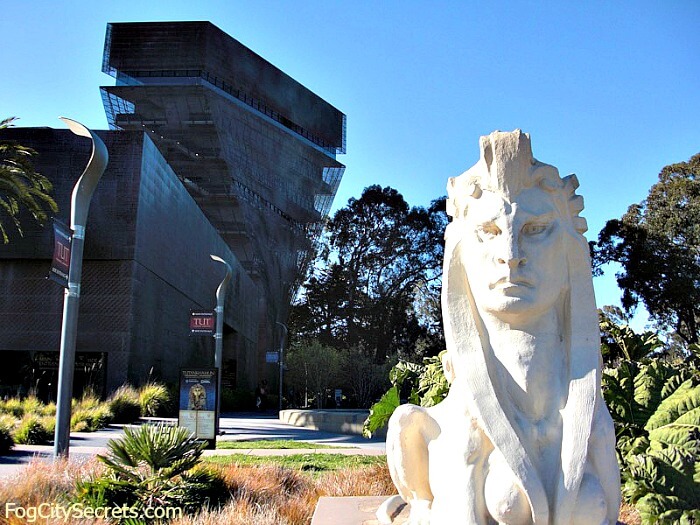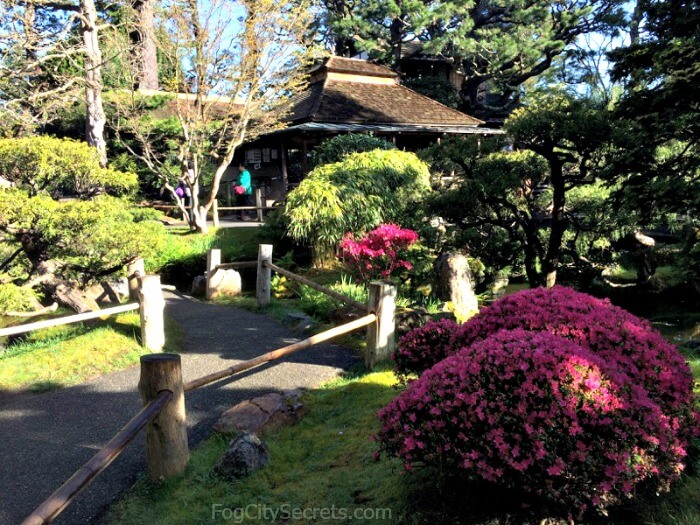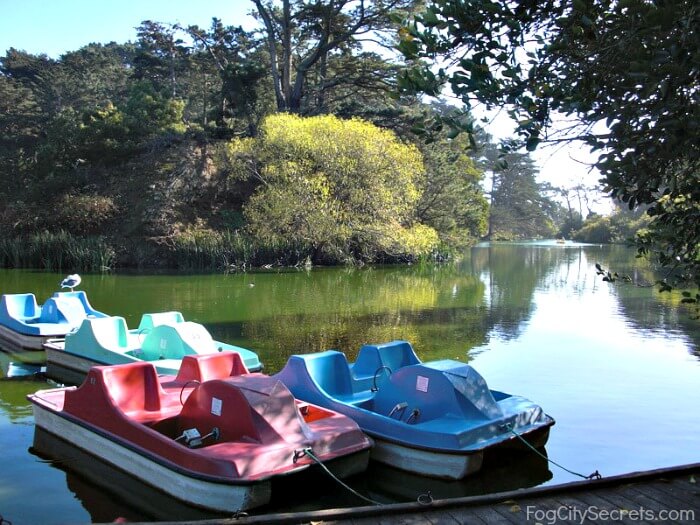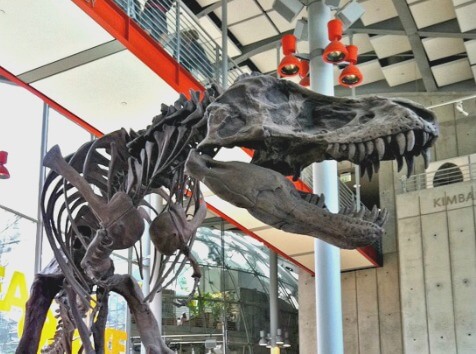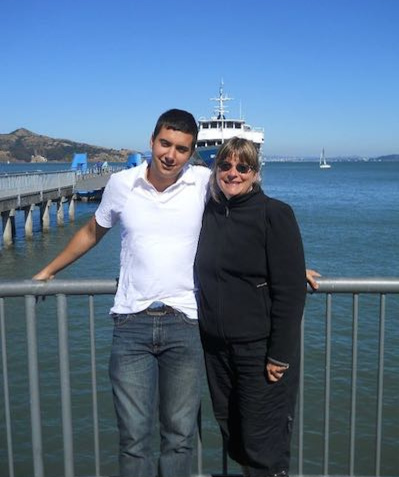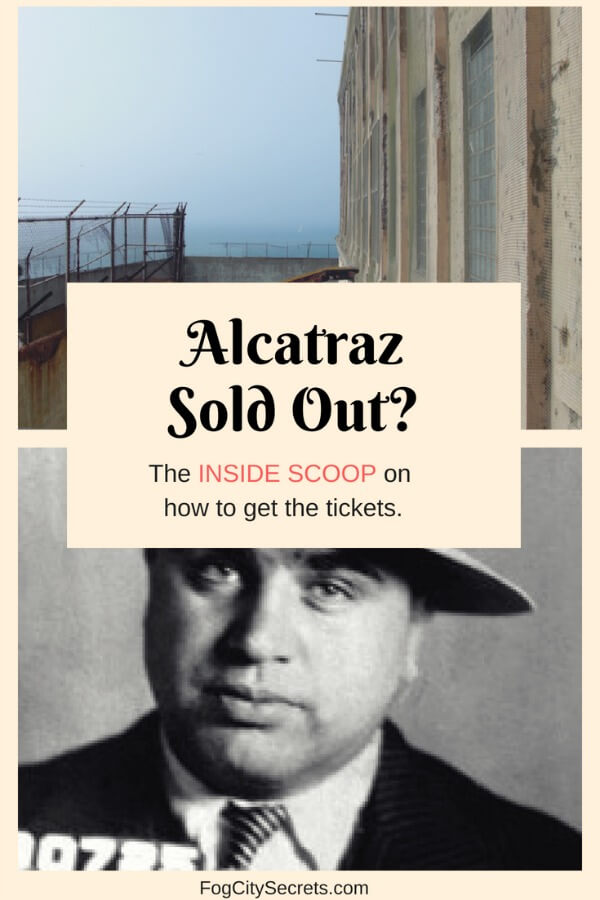- Home
- San Francisco Attractions
- Golden Gate Park
- Conservatory of Flowers
The San Francisco Conservatory of Flowers

The San Francisco Conservatory of Flowers is a survivor from another era, when ladies and gentlemen took tea in the conservatory and admired exotic plant specimens collected from around the world.
 Conservatory of Flowers
Conservatory of FlowersIn spite of a history of disasters, the Hall of Flowers is still with us and graces Golden Gate Park with its wedding-cake facade.
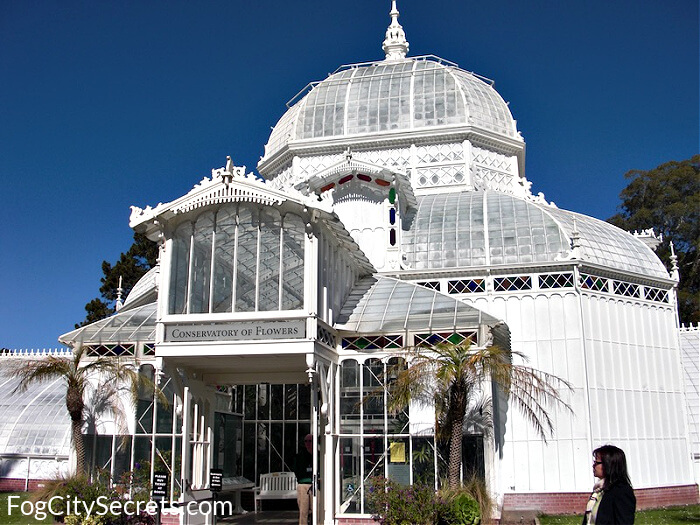 Entrance to the Conservatory
Entrance to the ConservatoryInside this Victorian confection is a lush world of orchids, primeval ferns and carnivorous plants.
And to top it off, the Conservatory of Flowers usually has some cool special exhibits, some of which involve miniature train sets with original themes.
Location of Conservatory
The Conservatory is in Golden Gate Park, 100 John F. Kennedy Drive.
(See map below.)
Conservatory Hours
Open: Thursday - Tuesday: 10:00 to 4:30, last entry 4 pm.
Closed: Wednesday
(Closed Thanksgiving, December 25, & January 1.)
Entry Fees
- Adults: $12.00 (Sat & Sun $15.00)
- Youth 12-17, Seniors 65+: $7.00
- Kids 5-11: $3.00
- 4 and under: free
- SF residents, veterans, and EBT card holders free (with ID).
Admission is free the first Tuesday of each month.
Buy the tickets at the door. You can buy them online but there is no advantage to it (in fact, they charge an extra $3.75 per ticket online!).
Tours
Prior to Covid, the Conservatory had docent tours where you could hear about the Conservatory and its plants on their one hour tour. They even handed out plants and cutting to guests. Now, they will do docent tours if requested in advance; contact the Conservatory for details.
Audio Tours. They used to have an audio tour available for purchase at the entry, but not anymore, apparently.
Conservatory Light Shows
The Photosynthesis Light Show in 2025
The Conservatory started a program to light up the surface of the building in fantastic forms, geared towards special events.
It all started with the Summer of Love (the 50th anniversary in 2017), with the facade covered with psychedelic visions.
Annually (suspended in 2020 because of Covid) in November through January, the Conservatory lit up the inside and outside during their Night Bloom program. Night Bloom was a sight and sound show, plus refreshments, inside the plant galleries.
In 2023, the Photosynthesis Light Show was created. Now, the Conservatory puts on a nightly, psychedelic (very San Francisco) light show on the surface of the building.
Starting in April of 2025, it's on every very night, starting 30 minutes after the sun goes down. Visitors are treated to a mind-bending, light show, with musical accompaniment. The content changes with the seasons. Plays until midnight.
 Winter Lights
Winter LightsHistory of the Conservatory
The San Francisco Conservatory of Flowers is the oldest wood and glass conservatory in North America. It was built in 1878-79, at a time when the Victorians were wild about exploring exotic lands and discovering strange new plants.
 Conservatory of Flowers 1897
Conservatory of Flowers 1897Every grand house had its conservatory to display its plant collection, and the passion for orchids became extreme. Orchid hunting occasionally took on ruthless aspect in the competition for the rarest specimens. So naturally, the Conservatory provides visitors with a great orchid experience.
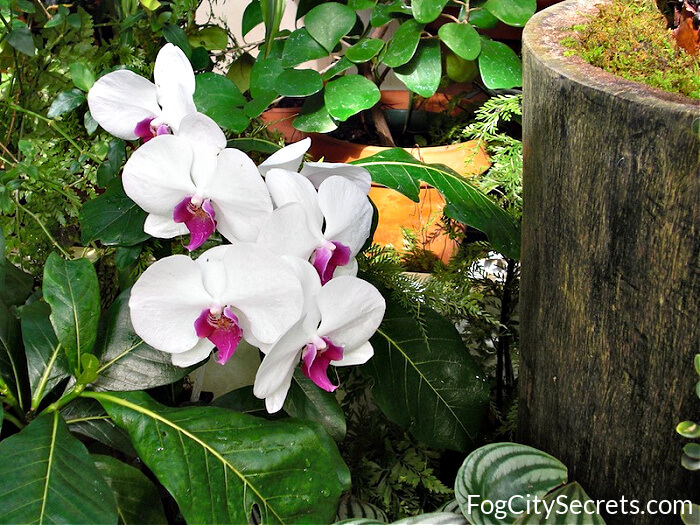 Orchids
OrchidsThe central area and dome were destroyed by fire in 1883 when the boiler exploded. More fires related to the boiler plagued the building, and it was closed from 1933 to 1946 because of structural problems.
The ferocious windstorm of 1997 caused extensive damage to the fragile wood and glass Conservatory. Broken glass and structural damage sidelined this popular San Francisco attraction until it reopened in 2003. Fortunately, no problems since then!
Conservatory of Flowers: the Galleries
Entry into this green world takes you through a series of rooms that recreate different ecosystems representing a variety of jungly environments: lowland tropics, highland tropics, aquatic plants and a potted plants gallery.
Lowland Tropics Gallery
As soon as you come into this gallery, you know you're in a steamy, tropical jungle. You may have to take off your jacket. Water drips off the lush green ferns and in the back is the towering, 150-year-old philodendron.
Plants older than the dinosaurs, like the Cycad fern below, with its huge, hanging pods, recreate the primeval environment of 170 million years ago.
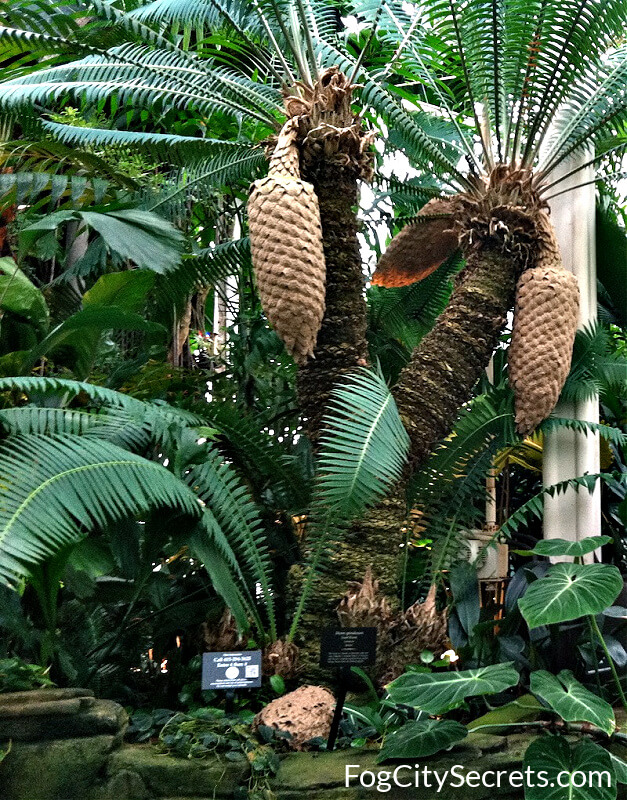 Primitive Cycad
Primitive CycadThis gallery also contains a number of food-related plants; you can get a chance to see what coffee, cacao, cinnamon, cardamom, allspice and banana plants look like.
Highland Tropics Gallery
The highland gallery is refreshingly cool after the hot lowland milieu. This area houses a collection of plants that live on the misty mountaintops of tropical regions around the world.
A large variety of beautiful orchids cling to the tree trunks, or are presented in special cases. Orchids do particularly well in these cool, damp regions, and the Conservatory has a large collection of them.
 Orchids
OrchidsThe San Francisco Conservatory of Flowers has one of only four tropical highland displays in the U.S.
Aquatic Plants Gallery
This is a delightful gallery with its spreading lily ponds and hibiscus flowers; watch for the clusters of carnivorous pitcher plants, patiently waiting for a bug to slip and fall in.
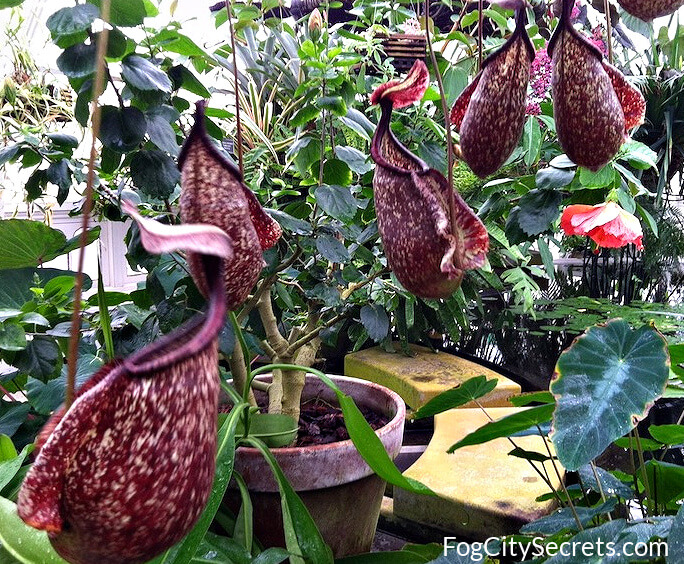 Pitcher Plants
Pitcher PlantsThe Victoria amazonium makes its home here: its gigantic lily pads can be six feet across and support the weight of a child.
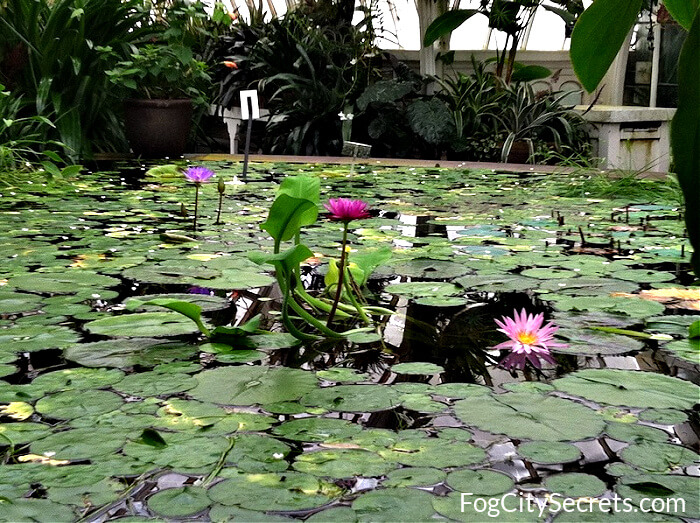 The Lily Pond
The Lily PondSometimes you come across the unexpected amidst the rocks and tree fronds!
 ?????
?????Potted Plants Gallery
The Victorians were big on potted plants; the gallery here presents seasonal displays in its collection of pots from Burkina Faso, Indonesia, India and other parts of the world.
Winter poinsettias, Chinese New Year kumquat and orange trees, and summer begonias are set out in season.
The wood-framed arbor, Asian-inspired, with climbing orchids, is also in this gallery.
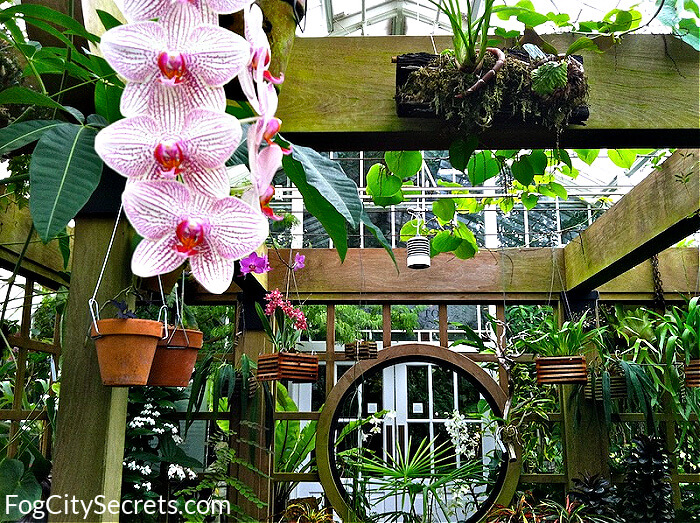 More Orchids
More OrchidsThe Victorians were big on potted plants; the gallery here presents seasonal displays in its collection of pots from Burkina Faso, Indonesia, India and other parts of the world.
Winter poinsettias, Chinese New Year kumquat and orange trees, and summer begonias are set out in season.
The wood-framed arbor, Asian-inspired, with climbing orchids, is also in this gallery.
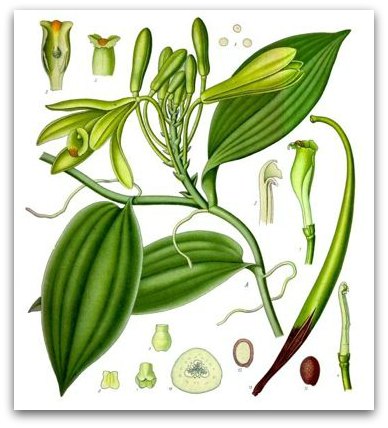 Vanilla Plant
Vanilla PlantSpecial Exhibits
Usually twice a year, the San Francisco Conservatory of Flowers puts on a special exhibit in the room at the far left of the building.
They're quite creative; one year they had dinosaur models lurking in vegetation consistent with their geological periods, with a T-Rex poking his head out of the top of the building.
One of the exhibits every year generally involves an elaborate model train set-up, a big hit with the kids, and fun for older train-fans, too. Surrounded by lots of plants, of course.
 Trolley Exhibit
Trolley ExhibitOne of the exhibits was a recreation of San Francisco landmarks, arranged around a train track.
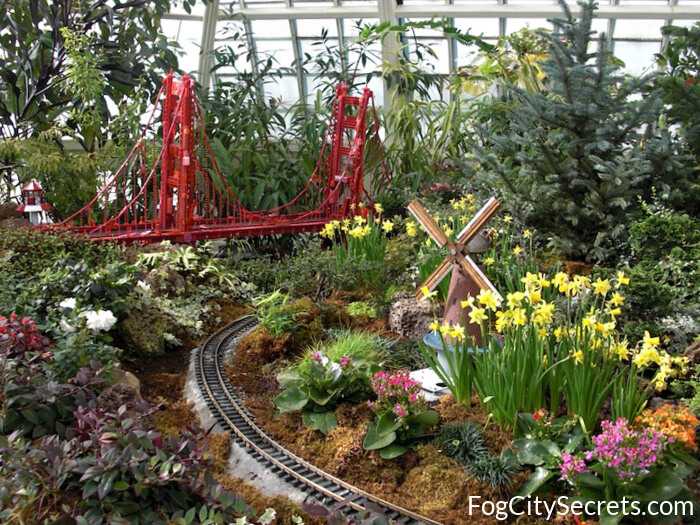 SF Landmarks
SF LandmarksHow to Get to the Conservatory of Flowers
The Conservatory of Flowers is in the eastern end of Golden Gate Park, on JFK Drive, just down the road from the de Young Museum (about a 15 minute walk).
Public Transportation
The 5-Fulton bus will bring you reasonably close. Get off as close to Arguello at Fulton as you can; Arguello runs right into the park and past the Conservatory.
Or take the N-Judah street car and get off at 9th and Irving (a longer walk). You can catch either one on Market Street downtown (Muni is underground there).
Hop On Hop Off Bus
The double-decker, Hop On Hop Off Bus takes you out here as well. See HOHO Bus for info and booking.
Parking
JFK Drive in that area is now permanently closed to cars, but you can look for a space on Nancy Pelosi Drive or Bowling Green Drive nearby.
Or park on JKF Drive near the Crossover Drive (in the middle of the park) and take the free shuttle. The shuttle runs daily, about every 15 or 20 minutes, along JFK Drive through the eastern half of the park. It stops at the Conservatory. See information on the Golden Gate Park shuttle, with map of shuttle stops.
I wouldn't try the street parking outside the park on busy days unless you have a parking angel.
Map of SF Conservatory of Flowers
And nearby attractions in Golden Gate Park.
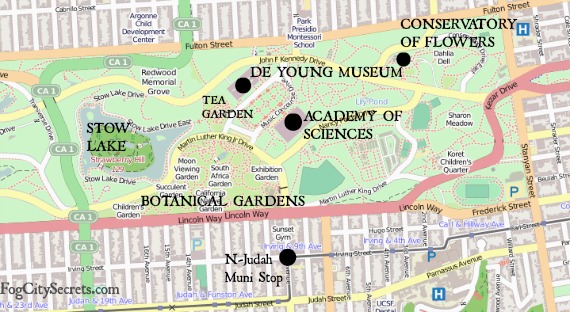
Find out all there is to do and see in Golden Gate Park: museums, lakes, windmills, bike rentals, and more.
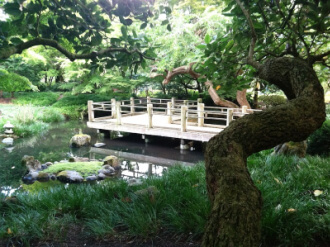 Moon viewing platform
Moon viewing platformMore flowers? The Botanical Garden (Arboretum) is close by, with 55 acres of beautiful plantings.
Golden Gate Park has all sorts of specialty gardens tucked here and there: the Rose Garden, Fuchsia Dell, Shakespeare Garden, Fern Grotto and more.
See the Gardens of Golden Gate Park, with photos and a map of their locations.
More to explore in the park...
Share this page:
